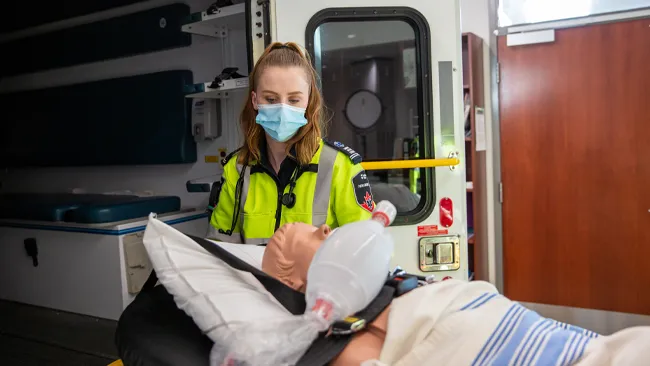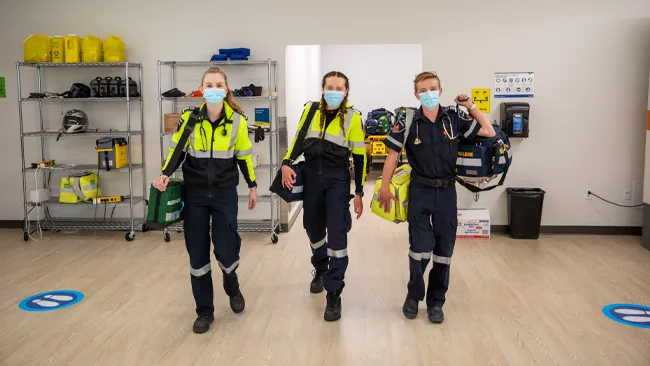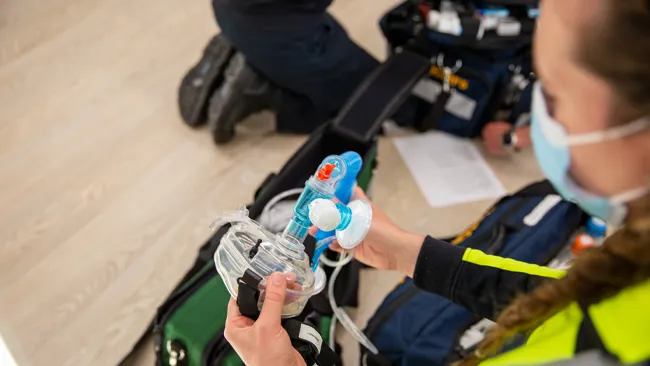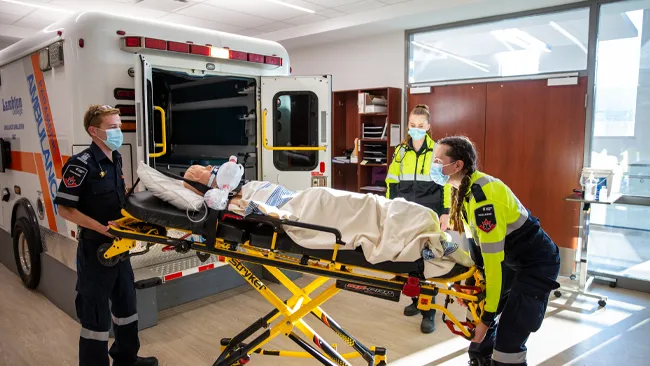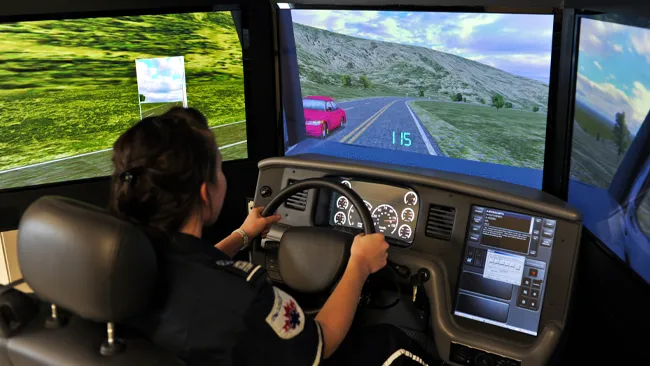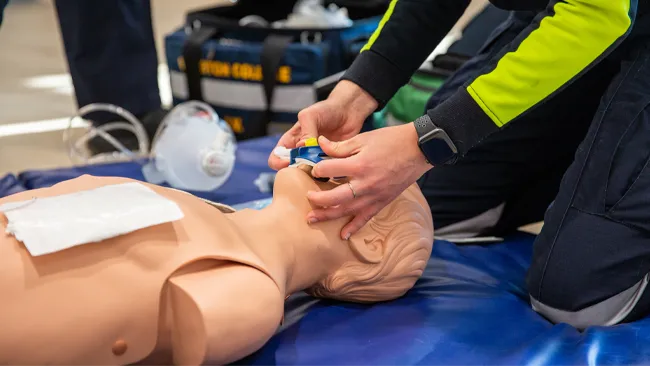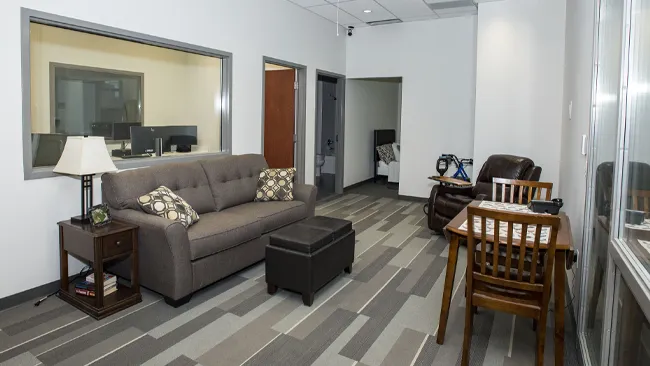
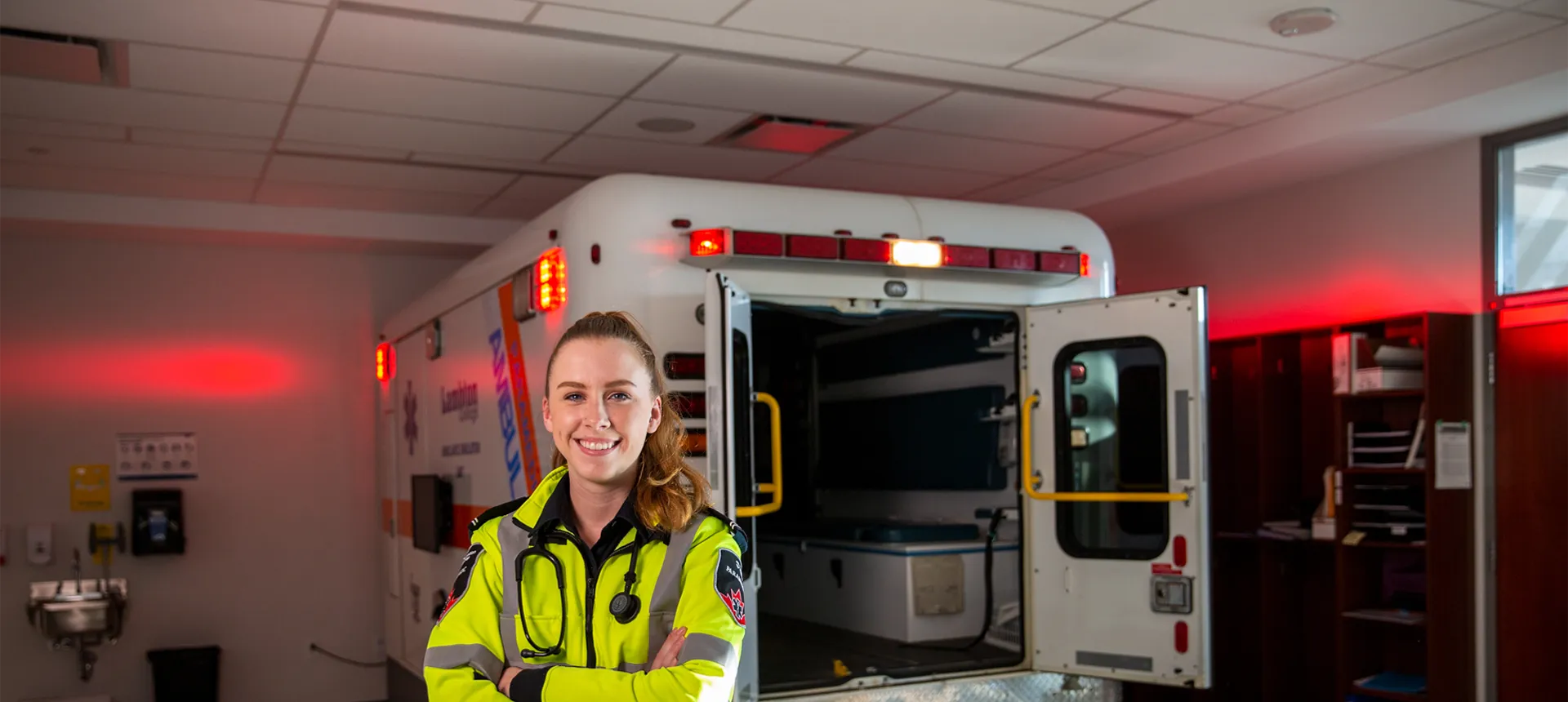
Paramedic
Overview
Are you the person who can be first on scene to provide life-saving treatment at a moment's notice? Discover the fast-paced career of a Paramedic.
Students looking for a challenging career opportunity in emergency care services, health facilities, and other health care agencies, will find that Lambton College’s Paramedic program can get them there with the skills they need to succeed.
Graduates apply relevant theory, practice safely and competently, and comply with current legislation, regulations, standards, and established policies and procedures. Students are encouraged to use the free gym membership since fitness is a major attribute to success in several areas of the program. Access to a vehicle is also required to attend clinical sites in terms 2, 3 and Consolidation in term 4. Students are encouraged to complete Class F Ontario Driver's License at their earliest convenience to prepare for employment opportunities.
Students choose Lambton College because:
Admission Requirements
O.S.S.D. or equivalent with an minimum grade of 70% in the following:
- Grade 12 English C or U
- Grade 11 or 12 Mathematics C or U
- Grade 11 or 12 Chemistry C or U
- Grade 11 or 12 Biology C or U
Suggested Skills
Students entering this program should have strong note taking skills and study habits and should be able to manage their time well.
Academic admission requirements can be obtained through Academic Upgrading and the Pre-Health Sciences Pathway to Advanced Diplomas & Degrees (PHDP) at Lambton College. All course requirements must be completed no later than the first day of classes of term one.
Costs
- Year 1 $4,156.71
- Year 2 $4,066.68
Please Note: These fees apply to the 2025-2026 academic year and are subject to change. Fees do not include books (unless specifically noted), supplies or living costs.
Year 1
Additional Fees
-
Lab Kit$165.00
-
Stethescope$100.00
-
Uniform$600.00
-
Steel Toed Boots$150.00
-
First Aid & CPR$200.00
-
N95 Fit Test$40.00
-
Criminal Record Check (per year)$40.00
-
Health Clearance$40.00
Year 2
Additional Fees
-
Lab Kit$105.00
-
First Aid & CPR$30.00
-
Comptracker Software$80.00
Travel Expenses
Students are responsible for all costs associated with traveling to clinical placements.
It is recommended that students have a vehicle for Terms 2, 3 and 4.
Technology Requirements
In order to keep pace with the requirements of each and every course in your program, Lambton College requires that each student have access to a laptop while studying at our college.
Labs & Equipment
Courses
Critical Thinking & Writing
This writing course challenges students to explore diverse opinions and articulate their own perspectives clearly and persuasively. Through critical reading, students will develop skills in synthesis, analysis, comparison, and response, striving for clarity and diplomatic expression of their opinions based on factual evidence. Students will practice various rhetorical strategies of persuasion and hone their writing to ensure precision and accuracy in their messages. This course lays the foundation for a subsequent research-writing course, equipping students with essential skills for academic success.
Patient Care Theory I
The major emphasis of this course is placed on the responsibilities of the student in assessing, managing and transporting patients in stabilized conditions, emergency situations and situations that may become emergencies. Students will learn the assessment, pathophysiological processes and management of various medical and traumatic problems that may afflict pre-hospital patients.
Patient Care Procedures I
In this course, the student will acquire the skills necessary to perform basic assessment and pre-hospital care interventions to victims of trauma. The student will apply those selected laboratory skills for the provision of basic pre-hospital emergency care in various simulated laboratory settings. At the end of this course, the student will be able to demonstrate his/her ability to lift, transfer, position, and transport patients in the pre-hospital settings (patient weighing up to 90kg). The student will also be able to demonstrate the safe and effective application of a variety of skills and equipment utilized by paramedic profession.
Medical-Legal Aspects
This course will introduce the ethical and legal responsibilities for the paramedic. This course is designed to introduce the student to the ability to apply relevant legislations and regulations that govern today's paramedic.
Anatomy & Physiology I
Course content provides a basic introduction to the interaction and interdependence of structure and function in humans. Application of this course content will be implemented in laboratory/clinical/field practice.
Human Behaviour & Crisis Intervention I
This course is designed to provide the student with a basic understanding of the changes in physical and psychosocial presentations when dealing with patients in crisis situations. Units covered will deal with death and dying as well as victims of abuse and those involved with substance abuse. Behavioural patterns will be examined and certain mental illness will be explored. There will be an understanding of the concepts of suicide, as well as how to manage the potentially violent patient.
Fitness for the Paramedic I
This course is designed to help prepare the student for the strenuous physical demands of Emergency Service employment. Students participate in various methods of cardiovascular, strength/endurance and flexibility training. Emphasis is placed on the students' understanding of the basic principles of fitness training and how these principles can be used to increase one's fitness level.
General Education Elective
Communications for Paramedics
This course tackles communications specific to paramedicine and is designed to further develop students' communication proficiency and research skills. Students will analyze and respond to paramedic scenarios to create accurate and clear paramedic written and verbal reports. Students learn medical terminology and abbreviations common to the field to improve the accuracy of their documentation. Advocacy and peer education will drive the research and documentation process. Current paramedicine issues and research will serve as the impetus for creation of informed research projects and presentations, equipping students with strategies for continued professional development.
Patient Care Theory II
This course is a continuation of Patient Care Theory I. The major emphasis of this course is placed on the responsibilities of the student in assessing, managing and transporting patients in stabilized conditions, emergency situations and situations that may become emergencies. Students will learn the assessment, processes and management of various medical problems that may afflict pre-hospital patients.
Patient Care Procedures II
In this course, the student will acquire the skills necessary to perform specific assessments and pre-hospital care interventions for victims of trauma or the critically ill. The student will learn to recognize complications and minimize them, either at the scene or during transport by ambulance. The student will apply laboratory skills for the provision of specific pre-hospital care in various simulated laboratory settings. Upon completion, the student will be able to demonstrate the ability to perform skills related to the medical and trauma conditions studied in PARA 2004.
Pathophysiology - Emergency Medical Care
This course is designed for students who have a general understanding and working knowledge of the structure and function of the human body. Students will study how and why a disease develops and progresses. The focus will be on pathophysiology of diseases and situations requiring emergency medical care.
Anatomy & Physiology II
This course is the second part of a two part anatomy and physiology course designed for students enrolled in the Paramedic Program. It is a continuation of the structures and physiology that make up the human body. It will complete the study of the body in preparation for the study of pathophysiology and patient care procedures.
Clinical Experience I
Practical observation and experience will be provided in several settings. Students will observe and apply theoretical content of previous courses in settings that may include Paramedic Services, Dispatch Centers, Long-Term-Care Facilities, Hospice, and numerous hospital departments.
Fitness for the Paramedic II
The focus of this course is to help prepare the student for the physical demands faced by the Paramedic. Paramedic employment is acknowledged to be a physically demanding and hazardous civilian occupation. Both the highly strenuous nature of a Paramedic's job and the unusually high incidence of job-related injuries are well documented. However, when Paramedics meet established medical and fitness standards, the incidence of accidents and injuries is reduced and job performance is enhanced.
Patient Care Theory III
The major emphasis of this course is placed on the responsibilities of the paramedic in assessing and treating patients with various medical conditions using best practice guidelines in conjunction with the Basic Life Support Patient Care Standards of Ontario. The learner will incorporate pathophysiology and their prior knowledge of patient care assessment techniques and decision making skills to new theoretical patient care situations including, but not limited to, toxicological, environmental, and obstetrical emergencies. Special care situations such as geriatric, pediatric, neonatal, multi-casualty and biological warfare are incorporated to stress the importance of the learners adaptation to dynamic situations. Patient Care Theory III is a continuation of Patient Care Theory II.
Patient Care Procedures III - Lab
This course is a continuation of Patient Care Procedures II. The student will acquire the skills necessary to perform specific assessments and pre-hospital care interventions for patients of all types of medical and traumatic emergencies. In a scenario setting, the student will recognize patient complications and minimize and treat them, either at the scene or during transport by ambulance. The learner will apply assessment skills and treatment according to specific pre-hospital emergency standards. At the end of this course, the student will be able to demonstrate their ability to perform skills related to the following pre-hospital emergencies: cardiac/respiratory, immunological, heat/cold, burns, pediatric, analgesic, diabetic, allergic, pregnancy and delivery/neonatal.
Operations & Professional Issues
This course emphasizes the techniques necessary to ensure driver and vehicle readiness for emergency service. Utilizing the classroom, students will acquire the skills required to maintain emergency vehicles and drive defensively avoiding hazards. Radio Communication skills, as well as hazardous material recognition in relation to W.H.M.I.S. The student will be introduced to the Canadian Triage and Acuity Scale System when reporting to hospital staff. Throughout the course we will develop the students' knowledge base in Professionalism and the techniques required to work effectively with expectations of the paramedic when interacting within a team setting. Professionalism and professional judgement will be discussed to ensure that the student will develop the knowledge to make decisions effectively.
Advanced Skills Theory
This course provides the learner with the cognitive knowledge and assessment skills necessary to become certified in and safely perform pre-hospital symptom relief and defibrillation. The learner will be introduced to advanced skills such as pre-hospital pharmacology and the delivery of medications, cardiac monitoring, semi-automated external defibrillation and an introduction to 12-lead ECG interpretation. The successful learner will adapt these skills to provide safe and effective patient care treatment in a theorectical setting. The learner's main focus will be to recognize and choose appropriate patient care treatment strategies based on patient assessment and evaluation in dynamic pre-hospital case study situations.
Clinical Experience II
This course provides the opportunity for the student to receive practical experience in the ambulance as well as various selected hospital departments. Under the direct supervision of a paramedic crew, the student will participate in, analyze and review emergency and non-emergency situations, which will form a basis for the consolidation experience and ultimately professional practice in the future. In the hospital setting, paramedic students are provided the opportunity to determine the influence of pre-hospital care on subsequent patient care. It provides a realistic yet supervised setting for direct patient care in which learners will have the opportunity for skill development related to patient assessment, supportive care and observed treatment as well as participation with the health care team. To achieve the purposes of the hospital clinical experience, the following clinical areas may be utilized: 1. intensive care, cardiology, neurological, post-anesthesia, emergency department, labour and delivery, mental health and withdrawal, acute medicine, and respiratory therapy.
Fitness for the Paramedic III
This course is designed to help further prepare the paramedic student for the physical demands of emergency service employment. Using previously learned physical training techniques the focus is for students to continue to enhance their abilities to lift and transfer patients in simulated training sessions. The effects of shift work and job related stress on the physical and mental health of the Paramedic is also examined.
General Education Elective
Clinical Experience III - Consolidation
This course provides the student with a concentrated period of field experience to further develop the ability to assess and meet the needs of the patient. Under the direct supervision of a paramedic crew the student will review, participate in and analyze emergency situations, which will form a basis for professional practice in the future.
Paramedic Comprehensive Review
As the concluding component of the program, students enrolled in this comprehensive course will consolidate key concepts of pre-hospital care. The student will be removed from their clinical placement and will return to the college to write two comprehensive A-EMCA style examinations.
General Education Elective
Progression Requirements
Students are required to obtain a minimum grade of 63% in all courses in order to progress to the next term in the Paramedic program.
Contact
School of Fire Science, Health & Community Services
Program Information
After Graduation
Employment Opportunities
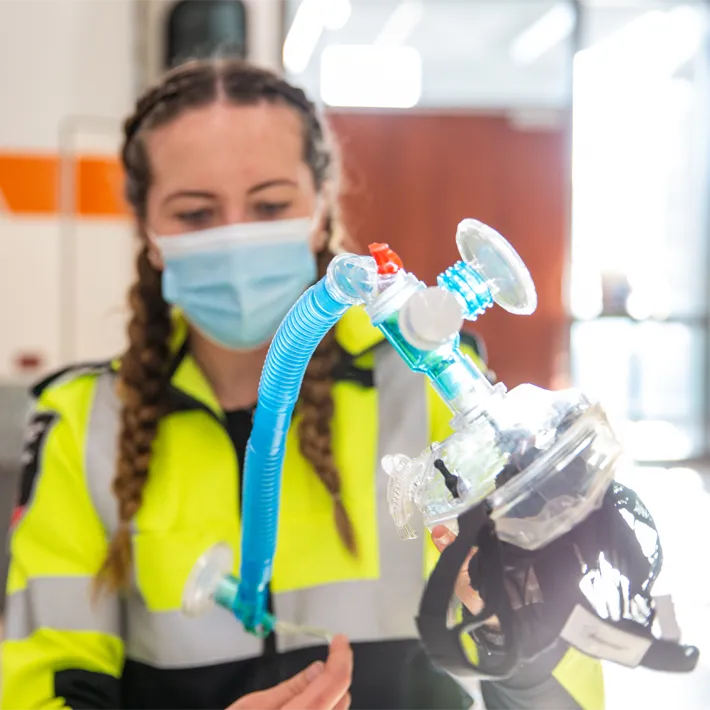
Our graduates are employed in emergency medical services. Graduate employment opportunities are city and county led and the application process generally begins in Term 4. Some graduates further their education to the Advanced Care Paramedic level. A Class F driver’s license is required for employment.
Accreditations & Certifications
Advanced Emergency Medical Care Assistant Exam
Upon successful completion of the program, the graduate will be eligible to sit for the Ontario Ministry of Health's Advanced Emergency Medical Care Assistant Exam.
Regional Base Hospital Program
In addition to AEMCA, employed graduates will be presented to a Regional Base Hospital Program for Certification to administer medications and perform advanced medical skills.
Pathways
Build on your education and complete a college diploma or university degree in Ontario, Canada, or abroad
Want to see more Ontario transfers? Visit ONTransfer.ca.
Qualifications for Employment
Applicants should be aware of the following qualifications for employment (as outlined by the Ambulance Act of Ontario):
- For a period of one year before the date graduates begin employment, they must not have had six or more demerit points on their record by the Registrar of Motor Vehicles under the Highway Traffic Act.
- For a period of two years immediately before graduates begin employment, they must not have had their driver's license suspended under the Highway Traffic Act.
- For a period of three years immediately before graduates begin employment, they must not be prohibited under the Criminal Code of Canada from driving a motor vehicle in Canada.
- Graduates must hold an Ontario Secondary School Diploma (O.S.S.D.) or equivalent as set out by the Ministry of Education.
Placement
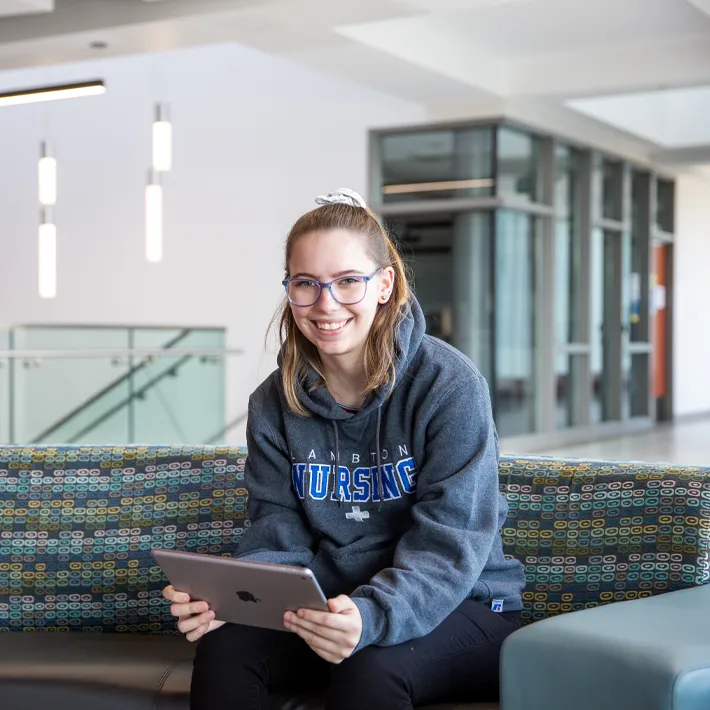
Vaccinations & Police Record Checks
Students considering this program should be aware that there are field placement requirements. All placements require students to have police record checks. Proof of immunizations is also required and must be cleared through Passport to Placement.
Once you’ve applied, you can log in to mylambton.ca and view the program-specific Field & Clinical Placement Requirements. If you need information about these requirements before applying, please contact placementinfo@lambtoncollege.ca.
More Information
Physical Demands
Students in this program are required to perform the following:
- Attain and maintain an appropriate level of physical fitness, proper body mechanics, and health to safety extricate, lift, transfer, position, and transport patients.
- Perform two person lifts and transfers, in a safe, smooth, controlled manner, of patients weighting up to 95 kg (210 lbs) utilizing appropriate patient lifting equipment.
Program Standards
Students are tested regularly in the program to ensure they are meeting fitness levels. A paramedic student requires a high level of aerobic fitness, flexibility, and strength. The Paramedic Program Standards from the Ministry of Colleges and Universities state that the graduate has reliably demonstrated the ability to "perform competently all two-person lifts and transfers of patients weighing up to 95 kg (210 lbs) and of the necessary equipment."
Candidates who are uncertain if they have the strength and fitness for this program are recommended to complete a Canadian Physical Activity, Fitness, and Lifestyle Appraisal and to score at least in the average level. Candidates should also be able to lift 95 kg (210 lbs) prior to enrollment.

Sarnia Sting Partnership
Lambton College and the Sarnia Sting have formed a partnership to enhance experiential learning opportunities for students. The Sting organization offers paramedic students the opportunity to assist with paramedic services during the Sting games and other events organized at the Progressive Sales Auto Centre Arena.
Technology Requirements
It is recommended that you use a Windows laptop for your coursework. While other devices like MacBooks or Chromebooks might work for some tasks, they may not support all the software required for your program. If you're unsure, check with your professors before buying.
Internet Speed Requirements
To get the best experience while learning online, we recommend having an internet connection with at least 40 Mbps download speed and 10 Mbps upload speed. This will help you use video calls, attend online lectures, and access other learning tools smoothly.
Because students live in many different areas, we can't suggest a specific internet provider. You'll need to check with local companies to find one that works best for you.
Laptop Requirements
In order to access the internet and virtually-delivered software and courseware, student laptops should include the following at a minimum. By meeting the following specifications, students will be equipped to access software and courseware on their laptop through the internet:
- Intel i5 8th Gen Processor or equivalent
- 8GB of RAM
- 100 GB HDD or more
- Webcam with a microphone
- Wi-Fi capable (802.11n/ac 5GHz)
- Windows 11 operating system
Mobile Device
Students will require a mobile device (smartphone) for:
- Accessing your digital student ID
- Using campus applications and services
Software
To ensure students are getting the most our of their classroom experience, some software will be required.
Lambton College has made this software easily accessible online. Students can leverage our Microsoft Office 365 software packages and services. In addition, much of the software you require for your courses will be available on demand for use on any device - on or off campus.
